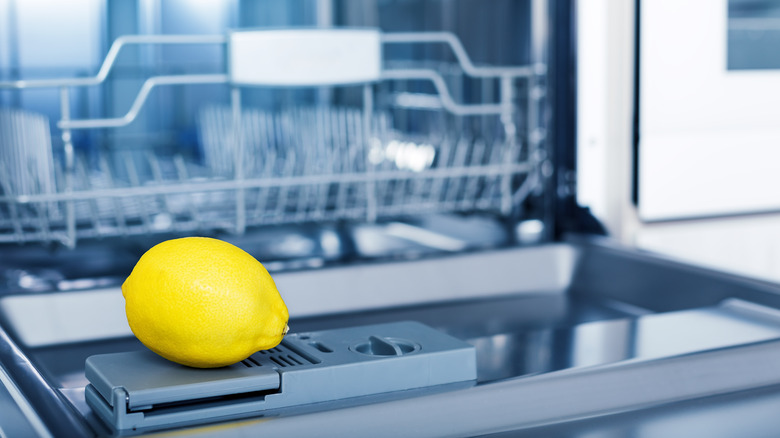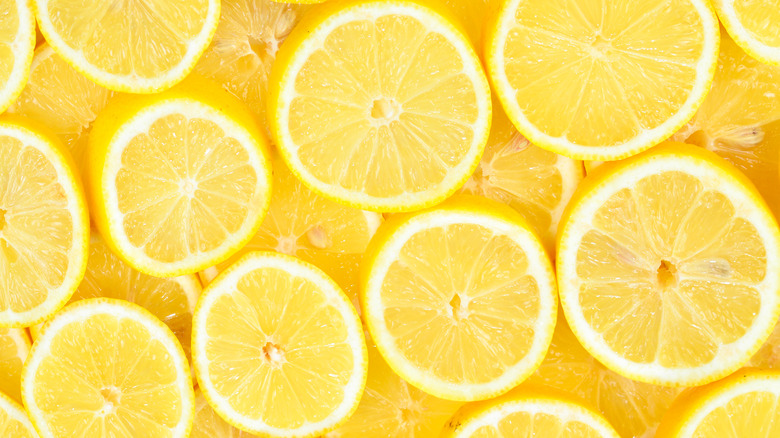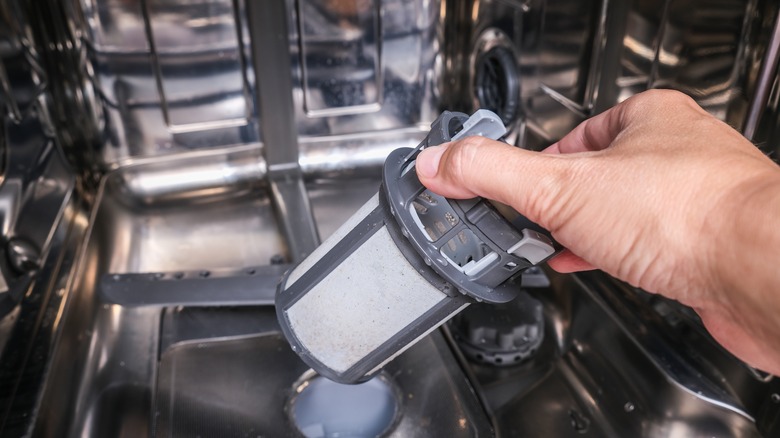Why You Should Add A Lemon To Your Dishwasher Before Running It
Dishwashers are wonderful appliances that make kitchen clean-up much easier. But like any kitchen appliance, they do benefit from some regular care and maintenance. Dishwashers tend to build up limescale and other residues from the minerals in tap water (especially if you have hard water) and from detergents. They can also become a bit messy from the build-up of soaps and detergents. One of the simplest and best ways to help clean this residue is by using a lemon in the dishwasher.
Limescale and soap deposits are both alkaline in content, and lemon is acidic. These two substances are opposites, like oil and water. Lemon juice reacts with the limescale (just like when you mix baking soda with vinegar), and the chemical reaction loosens and begins to dissolve the limescale so it can be scrubbed or washed away.
There are several different ways you can use lemon or lemon juice to clean limescale and mineral deposits in your dishwasher. If you don't have a fresh lemon, you can use reconstituted lemon juice.
How to add a lemon to your dishwasher
Any lemon will do, but one that is ripe, soft, and juicy will give you more lemon juice. Be sure to remove any seeds because these can clog the filter or other mechanisms in your dishwasher and possibly cause it to malfunction. Slicing the lemon thinly will ensure you don't miss any seeds.
Place the thin slice (or two) of lemon (or a tablespoon of lemon juice) in the detergent compartment of your dishwasher, then run it on any wash cycle. That's it! Your dishwasher's build-up of lime scale or other mineral deposits will be loosened. You might need to then use a gentle scrub brush to brush away any residue. Rinse with water and wipe clean with a sponge.
Now that your dishwasher is nice and fresh, you'll want to prevent the build-up from forming again too quickly. Pouring a teaspoon of lemon juice or vinegar in the detergent compartment when you run your dishwasher (along with the usual detergent you use) will help prevent soap scum buildup. It will also help prevent limescale from forming too quickly.
Keeping your dishwasher clean
Using a lemon to clean your dishwasher is a thrifty and effective way to keep it clean. But if you notice bits of food waste or paper from labels clogging or sticking to the inside of your dishwasher, be sure to remove them right away. Running your dishwasher repeatedly with stuff that's not supposed to be in there can gum up the works. Of course, scraping and rinsing your plates, bowls, and flatware also helps keep your dishwasher in good working order.
You should also make sure you only use actual dishwasher soap in your dishwasher. Don't be tempted to add laundry soap or other soaps if you run out of dishwasher powder or liquid: these products are specially formulated to work in your dishwasher. There are also commercial rinse aids sold in the store with dishwasher detergents that help keep spots off your glassware. These are essentially products that also help to prevent limescale build-up.
You should also clean your dishwasher filter out periodically. Scrub it softly with a soft brush and rinse it with vinegar. It pays to keep your dishwasher clean inside and out. Using a soft scrub brush or sponge with some baking soda is also a great way to clean any scummy surfaces on the door or the edges to keep them shiny.


